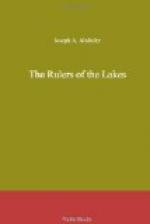THE HERALDS OF PERIL
The three, the white youth, the red youth, and the white man, lay deep in the forest, watching the fire that burned on a low hill to the west, where black figures flitted now and then before the flame. They did not stir or speak for a long time, because a great horror was upon them. They had seen an army destroyed a few days before by a savage but invisible foe. They had heard continually for hours the fierce triumphant yells of the warriors and they had seen the soldiers dropping by hundreds, but the woods and thickets had hid the foe who sent forth such a rain of death.
Robert Lennox could not yet stop the quiver of his nerves when he recalled the spectacle, and Willet, the hunter, hardened though he was to war, shuddered in spite of himself at the memory of that terrible battle in the leafy wilderness. Nor was Tayoga, the young Onondaga, free from emotion when he thought of Braddock’s defeat, and the blazing triumph it meant for the western tribes, the enemies of his people.
They had turned back, availing themselves of their roving commission, when they saw that the victors were not pursuing the remains of the beaten army, and now they were watching the French and Indians. Fort Duquesne was not many miles away, but the fire on the hill had been built by a party of Indians led by a Frenchman, his uniform showing when he passed between eye and flame, the warriors being naked save for the breech cloth.
“I hope it’s not St. Luc,” said Robert.
“Why?” asked Willet. “He was in the battle. We saw him leading on the Indian hosts.”
“I know. That was fair combat, I suppose, and the French used the tools they had. The Chevalier could scarcely have been a loyal son of France if he had not fought us then, but I don’t like to think of him over there by the fire, leading a band of Indians who will kill and scalp women and children as well as men along the border.”
“Nor I, either, though I’m not worried about it. I can’t tell who the man is, but I know it’s not St. Luc. Now I see him black against the blaze, and it’s not the Chevalier’s figure.”
Robert suddenly drew a long breath, as if he had made a surprising recognition.
“I’m not sure,” he said, “but I notice a trick of movement now and then reminding me of someone. I’m thinking it’s the same Auguste de Courcelles, Colonel of France, whom we met first in the northern woods and again in Quebec. There was one memorable night, as you know, Dave, when we had occasion to mark him well.”
“I think you’re right, Robert,” said the hunter. “It looks like De Courcelles.”
“I know he is right,” said Tayoga, speaking for the first time. “I have been watching him whenever he passed before the fire, and I cannot mistake him.”
“I wonder what he’s doing here,” said Robert. “He may have been in the battle, or he may have come to Duquesne a day or two later.”




